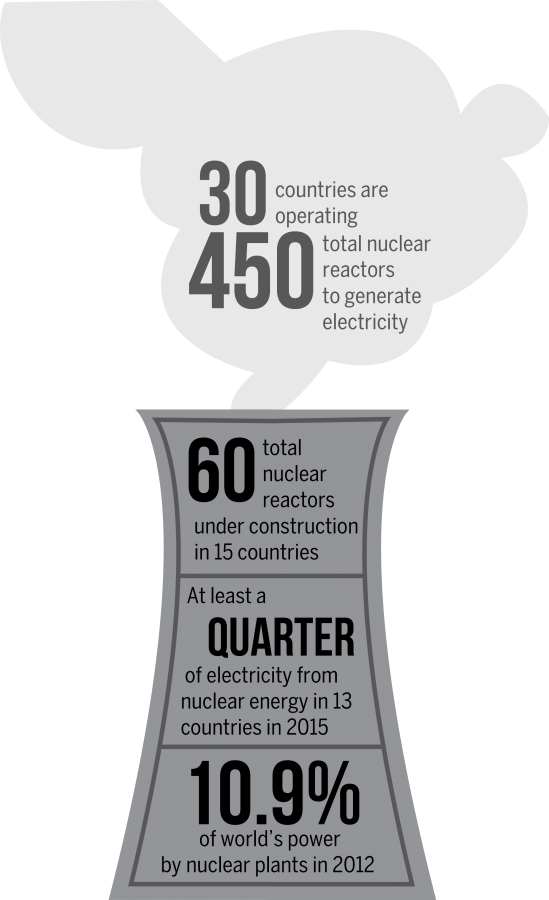Nations consider nuclear energy over fossil fuels
January 25, 2017
As the Earth’s supply of fossil fuels dwindles, more and more countries are turning to nuclear power as a source of sustainable energy, especially as global warming becomes a prominent problem in world affairs.
According to the World Nuclear Association, the U.S. generates more than 30 percent of the world’s nuclear electricity, making it the largest producer of nuclear energy in the world. Recent governmental policies such as the Energy Policy Act and the Nuclear Power 2010 program have increased the U.S.’s dependence on nuclear energy.
“Currently [the U.S. has] been getting somewhere around 17 percent [of] power from nuclear energy which is nice, but it could be 30 [percent], and I think it needs to be increased with modern technology since [of] all reactors being built, half are essentially technology of the 60s and 70s,” Dr. Peter Hosemann, Associate Professor at the Nuclear Engineering department of University of California Berkley said. “If we really wanted to make things better, more efficient, [and] safer, they should go and build new ones, but in order to do that we [have] to see if the current set of regulations is appropriate.”
Nuclear energy frees countries from relying on fossil fuels for energy and reduces their carbon emissions, as nuclear waste products consist of only hot water and radioactive material. Nuclear energy is also recyclable, meaning that nuclear waste can be used for production of more energy, making it sustainable to an extent.
Japan and France both rely heavily on nuclear energy: a study conducted by the World Nuclear Association in 2016 found that 30 percent of Japan’s energy and 75 percent of France’s energy are generated from nuclear power. In fact, France is the world’s largest net exporter of electricity because of the country’s low cost of electricity generation and high standardization of reactors.
A study conducted by the World Nuclear Association in 2016 found that 30 percent of Japan’s energy and 75 percent of France’s energy are generated from nuclear power.
However, nuclear reactors are expensive to build and maintain. The nuclear waste left over from production must be controlled for a long time because some of the leftover radioactive atoms are not stable enough to be safe. These unstable atoms could take up to thousands of years to harbor a high enough energy to keep the nuclei together, and setting up waste control systems that last long enough is complicated and expensive.
“If we ever get fusion [reactors] working, we will have unlimited energy sources for the planet with no nasty side effects because you can’t turn a fusion reactor into a bomb, and if something goes wrong, it just stops working,” Computer Science Department Chair Dr. Eric Nelson said. “It shuts itself down, so there’s no waste products other than helium.”
Nuclear reactors that use highly enriched uranium, which contains more fissile material than natural uranium, could also lead to nuclear terrorism or warfare because the enriched uranium is a critical component in weaponization. Nuclear reactors can also melt down when their cores overheat, causing radioactive materials to be released. For example, during the Fukushima disaster in 2011, a tsunami ruined the cooling generators for the reactors, leading to a nuclear meltdown. This is a concern for many as the radioactive materials are harmful to the environment.
According to the World Nuclear Association, 30 countries run 450 nuclear reactors, and over 45 countries have been considering a switch to nuclear energy in recent years for its benefits over fossil fuels.
Despite these disadvantages, new models of nuclear reactors aim to popularize nuclear power. According to the American Chemical Society, reactors that use the Liquid Fluoride Thorium Reactor (LFTR) design are safer and more sustainable than a uranium reactor because they produce much less waste, use a more abundant element, cannot be weaponized and allow nuclear material to be air-cooled in the event of a disruption.
According to the World Nuclear Association, 30 countries run 450 nuclear reactors, and over 45 countries have been considering a switch to nuclear energy in recent years for its benefits over fossil fuels. Fifteen countries, including the United Arab Emirates and Belarus, are currently building 60 power reactors, and countries such as Turkey and Poland already have committed plans and are developing regulatory infrastructures.
“I think we will eventually have to switch to [nuclear energy],” said debater Lauren Fu (9), who researched the subject for a recent debate topic. “The Earth’s temperature has already risen one degree Celsius, and if [it rises again by] two degrees Celsius, then it will basically cause mass extinction, so I think we will have to use it some time in the future.”


















![“[Building nerf blasters] became this outlet of creativity for me that hasn't been matched by anything else. The process [of] making a build complete to your desire is such a painstakingly difficult process, but I've had to learn from [the skills needed from] soldering to proper painting. There's so many different options for everything, if you think about it, it exists. The best part is [that] if it doesn't exist, you can build it yourself," Ishaan Parate said.](https://harkeraquila.com/wp-content/uploads/2022/08/DSC_8149-900x604.jpg)




![“When I came into high school, I was ready to be a follower. But DECA was a game changer for me. It helped me overcome my fear of public speaking, and it's played such a major role in who I've become today. To be able to successfully lead a chapter of 150 students, an officer team and be one of the upperclassmen I once really admired is something I'm [really] proud of,” Anvitha Tummala ('21) said.](https://harkeraquila.com/wp-content/uploads/2021/07/Screen-Shot-2021-07-25-at-9.50.05-AM-900x594.png)







![“I think getting up in the morning and having a sense of purpose [is exciting]. I think without a certain amount of drive, life is kind of obsolete and mundane, and I think having that every single day is what makes each day unique and kind of makes life exciting,” Neymika Jain (12) said.](https://harkeraquila.com/wp-content/uploads/2017/06/Screen-Shot-2017-06-03-at-4.54.16-PM.png)








![“My slogan is ‘slow feet, don’t eat, and I’m hungry.’ You need to run fast to get where you are–you aren't going to get those championships if you aren't fast,” Angel Cervantes (12) said. “I want to do well in school on my tests and in track and win championships for my team. I live by that, [and] I can do that anywhere: in the classroom or on the field.”](https://harkeraquila.com/wp-content/uploads/2018/06/DSC5146-900x601.jpg)
![“[Volleyball has] taught me how to fall correctly, and another thing it taught is that you don’t have to be the best at something to be good at it. If you just hit the ball in a smart way, then it still scores points and you’re good at it. You could be a background player and still make a much bigger impact on the team than you would think,” Anya Gert (’20) said.](https://harkeraquila.com/wp-content/uploads/2020/06/AnnaGert_JinTuan_HoHPhotoEdited-600x900.jpeg)

![“I'm not nearly there yet, but [my confidence has] definitely been getting better since I was pretty shy and timid coming into Harker my freshman year. I know that there's a lot of people that are really confident in what they do, and I really admire them. Everyone's so driven and that has really pushed me to kind of try to find my own place in high school and be more confident,” Alyssa Huang (’20) said.](https://harkeraquila.com/wp-content/uploads/2020/06/AlyssaHuang_EmilyChen_HoHPhoto-900x749.jpeg)







